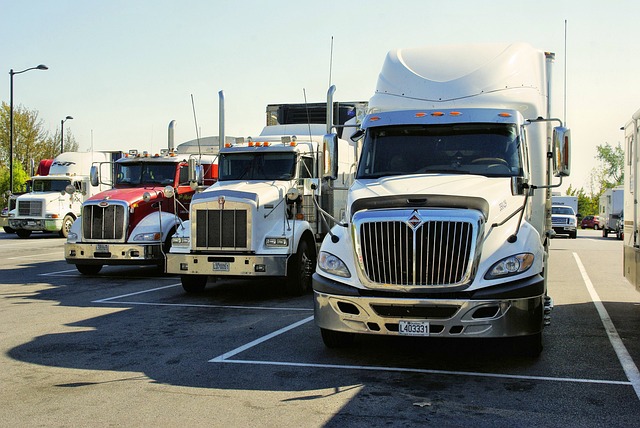Rental truck fleets face unique risks due to diverse drivers and varied usage, making temporary truck insurance a vital risk management tool. This specialized coverage fills gaps left by standard policies, offering flexible solutions for storage, transport, and idleness. Competitive fleet policies balance comprehensive protection with cost-effectiveness, featuring customizable options and swift claims handling. By leveraging tailored insurance solutions, regular maintenance, and driver training, rental fleets can optimize cost efficiency while ensuring adequate protection.
In the dynamic landscape of trucking, efficient fleet management demands more than just operational prowess; it requires competitive insurance solutions tailored to unique challenges. This article explores the intricate needs of rental truck fleets, focusing on the pivotal role of temporary truck insurance in risk mitigation. We delve into key features and benefits of cutting-edge fleet policies, offering strategies to optimize both coverage and cost efficiency. Understanding these aspects is essential for folks navigating the complex world of trucking risk management.
- Understanding the Unique Challenges of Rental Truck Fleets
- The Role of Temporary Truck Insurance in Risk Mitigation
- Key Features and Benefits of Competitive Fleet Policies
- Strategies for Optimizing Coverage and Cost Efficiency
Understanding the Unique Challenges of Rental Truck Fleets

Rental truck fleets face distinct challenges compared to traditional business vehicle operations. One of the primary concerns is managing a diverse range of drivers, often with varying levels of experience, who operate these vehicles for extended periods. This increases the risk of accidents and damage, making temporary truck insurance a vital component of fleet management.
Additionally, rental trucks are frequently used for various tasks, from local deliveries to long-haul transportation, which exposes them to different environments and potential risks. This variability necessitates flexible insurance solutions that cater to the unique needs of each operation, ensuring adequate coverage without unnecessary expenses.
The Role of Temporary Truck Insurance in Risk Mitigation

In the dynamic landscape of commercial trucking, where fleets are constantly in motion, temporary truck insurance plays a pivotal role in risk mitigation. This specialized coverage is designed to protect operators during periods when their vehicles are off their regular routes or not actively engaged in core operations. Whether it’s due to seasonal fluctuations, vehicle maintenance, or unexpected deployments, having temporary insurance ensures that fleet managers maintain adequate protection for their assets and liability coverage for any unforeseen incidents that may arise.
By offering flexible and tailored solutions, temporary truck insurance bridges the gaps left by traditional policies. It provides comprehensive coverage for non-operational scenarios, including storage, transportation to and from sites, and even during periods of idleness. This risk management strategy is particularly beneficial for rental truck fleets, which often face unique challenges due to their diverse customer base and varying usage patterns. By implementing temporary insurance, fleet operators can rest assured that they are shielded from potential losses, fostering a more secure and stable operational environment.
Key Features and Benefits of Competitive Fleet Policies

In today’s competitive landscape, businesses relying on rental truck fleets need robust insurance solutions that offer both comprehensive coverage and cost-effectiveness. Competitive fleet policies for temporary truck insurance cater to these specific needs by providing tailored protection for various risks inherent in fleet operations. Key features include flexible coverage options, customized liability limits, and access to dedicated support teams for rapid claims handling.
These policies deliver significant benefits, such as reduced financial exposure, enhanced operational continuity, and improved risk management. By prioritizing these aspects, businesses can focus on growing their fleets and expanding their operations without the constant worry of potential losses. Moreover, competitive rates make temporary truck insurance more accessible, allowing fleet managers to optimize their budgets while ensuring adequate protection for their assets.
Strategies for Optimizing Coverage and Cost Efficiency

To optimize coverage and cost efficiency for your rental truck fleet, consider tailored insurance solutions that address specific risks associated with temporary trucking operations. One strategy is to leverage commercial auto policies that offer flexible coverage options, allowing you to insure only the vehicles in use, saving on premiums for idle trucks. This approach aligns with the transient nature of rental fleets. Additionally, focusing on comprehensive and collision coverage can reduce costs while ensuring protection against physical damage.
Utilizing technology and data analytics is another effective method. Telematics devices installed in fleet vehicles can monitor driving behavior, enabling insurers to offer discounted rates for safe and efficient drivers. This not only incentivizes responsible driving but also helps identify areas for improvement within your operations. Regular fleet maintenance and driver training programs can further enhance safety, thereby lowering insurance costs through improved risk profiles.
In conclusion, navigating the complex landscape of insurance for rental truck fleets requires a strategic approach. By understanding the unique challenges these operations face, fleet managers can leverage powerful tools like temporary truck insurance to mitigate risks effectively. Competitive fleet policies, featuring tailored coverage and cost-saving benefits, offer a game-changing solution. Implementing strategies that optimize both coverage and efficiency ensures folks involved in this hustle and bustle can focus on their core business while staying protected.
